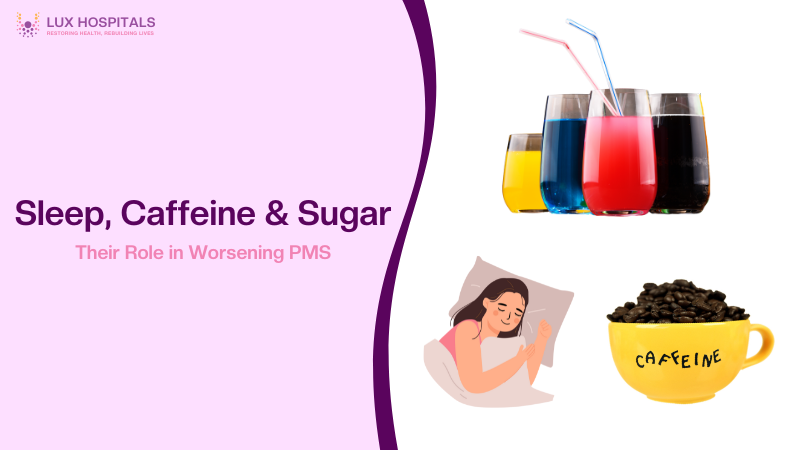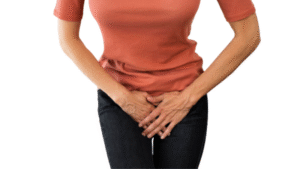Sleep, Caffeine & Sugar: Their Role in Worsening PMS Symptoms

PMS can be brutal. One minute you’re fine, the next you’re snapping at a random text, craving chocolate like it’s oxygen, and wondering why your jeans feel tighter. PMS symptoms are a monthly reality for many women, but have you ever stopped to think that your daily habits might be making them worse?
Sleep, caffeine, and sugar, three things we rely on to get through life could actually be working against you when it comes to PMS symptoms. Here’s how, and what you can do to feel a whole lot better.
What Are PMS Symptoms?
PMS (Premenstrual Syndrome) shows up like an uninvited guest in the week or two before your period. For some, it’s mild and manageable. For others, it’s a rollercoaster of emotional, physical, and mental chaos.
Common PMS symptoms include:
- Mood swings and irritability
- Cravings (especially for sweets or salty snacks)
- Fatigue and poor sleep
- Bloating and tender breasts
- Headaches and low energy
- Anxiety, sadness, or feeling overwhelmed
Hormones are the root cause, yes—but they don’t act alone. Your way of life has a major impact on how severe your PMS symptoms get. Let’s look at the three big culprits.
Everyday Triggers That Make PMS Harder Than It Needs to Be
1. Poor Sleep Makes Everything Worse
Ever noticed how PMS symptoms feel 10 times worse when you’re tired? There’s a reason for that. In the second half of your cycle, your hormone levels shift especially progesterone which can mess with your sleep. And when you’re not sleeping well, your body can’t regulate mood or stress properly. That makes mood swings more dramatic, pain more intense, and your patience nonexistent.
Here’s what poor sleep does:
- Increases cortisol (your stress hormone), making you feel more anxious and irritable
- Lowers your pain threshold—so cramps and headaches hit harder
- Drains your energy, which adds to the fatigue you already feel from PMS
Getting regular, healthy sleep is one of the easiest things to do. (and most underrated) ways to manage PMS symptoms.
Tip: Try going to bed at the same time each night, wind down without screens, and avoid caffeine late in the day.
2. Caffeine: Your Best Friend or PMS Enemy?
We get it—coffee feels like a lifeline, especially when PMS fatigue hits. But here’s the deal: caffeine may be making your PMS symptoms worse than they need to be.
Caffeine is a stimulant. It raises your heart rate, spikes your cortisol, and can leave you feeling jittery or anxious—on top of what your hormones are already doing. And if you’re someone who already deals with breast tenderness or mood swings, caffeine can amplify both.
Caffeine can:
- Make you more anxious or irritable
- Disrupt your already-fragile sleep
- Trigger or worsen breast tenderness
- Make sugar cravings even stronger
Tip: If you can’t give up your cup of coffee (and no one’s saying you have to!), try limiting it to just the morning. In the afternoon, switch to herbal tea or warm lemon water.
3. Sugar Cravings and the Vicious Cycle
Raise your hand if you’ve ever raided the pantry for chocolate before your period. Craving sugar is one of the most common PMS symptoms—and unfortunately, giving in can make everything worse. It’s not just about weight or calories. Because sugar increases blood sugar levels, it can cause mood swings, bloating, and increased cravings.
Sugar during PMS can:
- Spike and crash your energy levels
- Increase inflammation, making cramps and bloating worse
- Affect serotonin (your “happy hormone”), causing mood dips
- Feed into that tired-hungry-irritable loop
It’s okay to treat yourself in moderation, but being more mindful about sugar can really help reduce PMS symptoms.
Tip: Choose lower-sugar options like dark chocolate, fruit, or protein-rich snacks that satisfy without the spike.
How Small Changes Can Help Break the PMS Cycle?
Here’s where it gets tricky: sleep, caffeine, and sugar often go hand-in-hand. You’re tired, so you drink coffee. That makes you jittery, so you sleep poorly. You wake up exhausted and crave sugar to feel better. Then your blood sugar crashes, and you’re back at square one—with PMS symptoms thrown into the mix.
It’s a vicious cycle—but the good news is, you can break it. Every month, you can feel better by making minor adjustments to your everyday routine.
Simple Lifestyle Changes to Ease PMS Symptoms
You don’t need a complete lifestyle overhaul to feel better. Start with small changes and build from there.
Sleep smarter
- Stick to a routine (yes, even on weekends)
- Limit screens before bed
- Try calming activities like stretching, meditation, or journaling
Cut back on caffeine (a little goes a long way)
- Stick to one small cup in the morning
- Choose herbal teas in the afternoon
- Stay hydrated to reduce headaches and cravings
Balance your sugar intake
- Eat regular meals with protein and fiber
- Don’t skip breakfast
- Keep healthy snacks on hand so you’re not reaching for processed sweets
Track your cycle
Knowing when your PMS symptoms hit can help you prepare in advance. If you notice cravings, fatigue, or sleep issues showing up at the same time every month, plan for them. Adjust your habits during that week and see how it changes things.
When to See Doctor?
If PMS symptoms are affecting your work, relationships, or daily happiness, don’t tough it out alone. There’s help available. Some women experience PMDD (Premenstrual Dysphoric Disorder)—a more intense form of PMS that requires medical support.
Conclusion
Your daily habits matter more than you think. Sleep, caffeine, and sugar might seem harmless, but they have a direct impact on how your body handles PMS symptoms. The good news? You have the power to change how you feel—one small choice at a time.
So next time PMS rolls around, try making sleep a priority, swap that second coffee for a calming tea, and reach for a balanced snack instead of the candy bar. Your body (and your mood) will thank you.
Frequently Asked Questions
Yes, sugar can worsen PMS. It results in mood swings by causing blood sugar levels to rise and fall, fatigue, and increased cravings, which can intensify PMS symptoms like irritability, bloating, and anxiety.
Yes, caffeine can make PMS symptoms worse. It may increase anxiety, irritability, breast tenderness, and disrupt sleep, all of which can intensify PMS discomfort.
PMS can worsen due to poor sleep, high caffeine or sugar intake, stress, lack of exercise, and hormonal imbalances. These factors amplify symptoms like mood swings, fatigue, and bloating.
Doctors treat severe PMS with lifestyle changes, hormonal therapies (like birth control), antidepressants, dietary adjustments, and stress management. In some cases, they may recommend cognitive behavioral therapy or supplements.





















